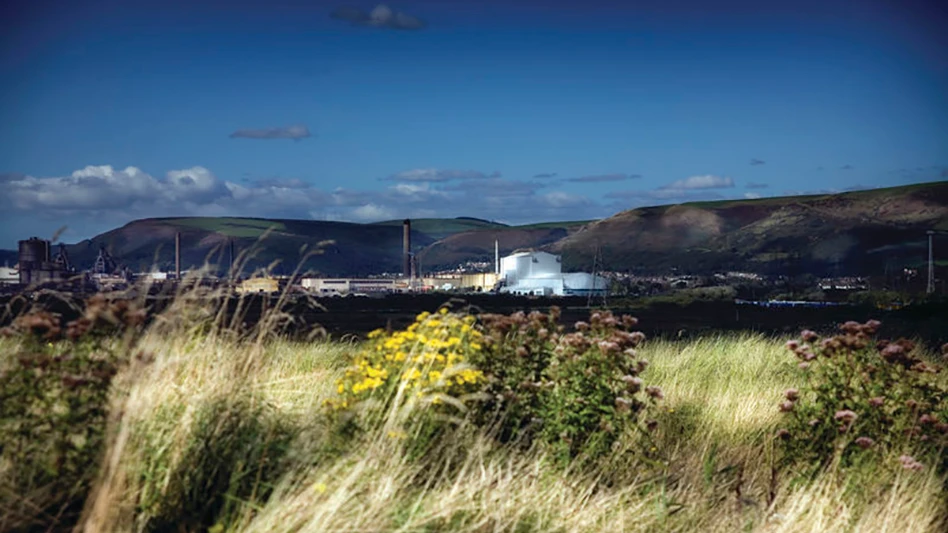
Photo courtesy of Tata Steel
As a ferrous scrap surplus nation, the United Kingdom should be poised to back the type of blast furnace/basic oxygen furnace (BOF) to electric arc furnace (EAF) conversions that have characterized the 2020s in several European nations, plus Canada.
Negotiators from the U.K. and two blast furnace operators—the Tata Steel UK subsidiary of India’s Tata Steel and the British Steel operations owned by China’s Jingye Group—have been meeting throughout the year, but neither deal is considered final as of early November.
Tata Steel had planned a news conference for last Wednesday to provide details about its conversion project in Wales, but the conference was canceled after a reported meeting between board members and union representatives.
This week, Jingye Group provided additional details about its plan to convert two BOF sites in England and Wales to EAF facilities but added the caveat that the projects were subject to appropriate support from the government.
Backers of the EAF conversions, including the steel firms themselves, have pointed to the decarbonization aspects inherent in scrap-fed production versus the natural resource-intensive blast furnace/BOF process.
EAF steelmaking also tends to be more labor-efficient, and that aspect is proving tougher to explain when it comes to spending public dollars to carry out the investments.
British media reports indicate Tata Steel UK would shed as many as 3,000 jobs after the conversion process is complete, and for British Steel the figure could reach 2,000.
A Trades Union Congress representative tells the BBC that the plans amount to seeing the U.K.’s steel industry “dismantled in real time.”
In an era when governments and corporations are creating scoring methods and systems to support lower-carbon production, however, the remaining blast furnaces in the U.K. seem to be burning money as fast as they are coking coal.
According to The Guardian, the Tata Steel UK operations lost about $173 million in this year’s third quarter. In an early-November interview with the India-based Economic Times, Tata Group CEO TV Narendran said, “Our UK business [has] always struggled in difficult market conditions, but added, “At least we have a plan for the future and we are restructuring our business.”
Chief Executive Xijun Cao of the Jingye Group has stated his company sees no future in blast furnace/BOF production in the U.K., “We have engaged extensively with the public and private sector to understand the feasibility of producing net zero steel with our current blast furnace operations. However, thorough analysis shows this is not viable,” he tells the BBC.
As the year draws to a close a combination of two Asia-based companies along with British politicians and labor union representatives will have to determine if the EAF conversion projects—lost jobs and all—represent the best option at the steelmaking sites.
This decade has provided rough stretches for nearly of the U.K.’s steelmakers. In addition to Tata Steel and British Steel seeking additional taxpayer dollars, two other steel producers in the nation have generated the wrong kinds of headlines in the financial press.
Spain-based Celsa Group, which operates a scrap-fed bar mill in Wales, fell into the hands of its largest creditors earlier this year after failed debt restructuring negotiations.
U.K.-based Liberty Steel, which operates eight facilities in the U.K., three with melt shops, has been fighting off the after-effects of the Greensill Capital collapse in 2021. That former finance firm had provided numerous services to Liberty Steel and its parent Gupta Family Group (GFG) Alliance.
Subsequently, the U.K.’s Serious Fraud Office has been investigating GFG, and Liberty Steel currently is being sued for being late on a sizable payment fellow steel producer ArcelorMittal says is owed it.
Latest from Recycling Today
- BMW Group, Encory launch 'direct recycling’ of batteries
- Loom Carbon, RTI International partner to scale textile recycling technology
- Goodwill Industries of West Michigan, American Glass Mosaics partner to divert glass from landfill
- CARI forms federal advocacy partnership
- Monthly packaging papers shipments down in November
- STEEL Act aims to enhance trade enforcement to prevent dumping of steel in the US
- San Francisco schools introduce compostable lunch trays
- Aduro graduates from Shell GameChanger program





